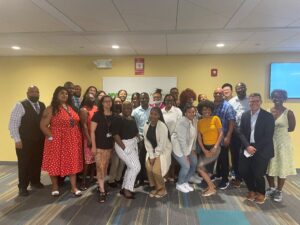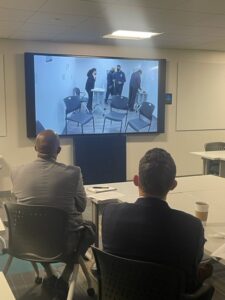The Office of Training and Workforce Development expanded innovative onboarding courses to support new hires in a variety of roles, from entry-level direct care workers to prevention case planners to new supervisors. Delivered to learners first through the James Satterwhite Academy (JSA) as they start their ACS career, and then interwoven with their job duties through the Workforce Institute (WI), these programs are designed specifically for the role into which the learner is hired.
Onboarding Innovation
Out of 20 foundational courses that JSA provided in Fiscal Year 2022, there are three main onboarding courses, designed specifically for Child Protective Specialists, Youth Development Specialists and Congregate Care staff.
All onboarding courses, whether child welfare or juvenile justice, include a mix of instructional methods, including case practice scenarios, role plays, simulations and/or structured on-the-job experiences. The programs bring together mandated training topics; outline policies, procedures and required practices; emphasize cross-cutting themes; and offer insight as to how one’s job responsibilities interact with others in the Child Welfare system.
The result of these offerings is an increased interest from learners requesting these innovative, foundational courses, with 786 new Child Welfare and Juvenile Justice staff completing the programs in FY22. Recruitment was higher this year, and both the Division of Child Protection (DCP) and the Division of Youth and Family Justice (DYFJ) requested additional foundational training for their existing staff who hadn’t been able to take part during the last few years, due in large part to the pandemic.
Delia’s YDS Journey
“I expected just another job [but] the experience was much more than just that,” says Delia Pricher, a Youth Development Specialist (YDS). “Before becoming a YDS, I would volunteer at Thomas Jefferson High School in Brooklyn, assisting students with college scholarship writing and applications, resume writing and, sometimes, personal issues that may have deterred them from attending school.”
Youth Development Specialists work as part of an interdisciplinary team to provide skill-based therapeutic interventions for youth involved in the juvenile justice system, including those at detention facilities. Delia says onboarding gave her the understanding and inspiration to put what she learned into action every day: “I have learned to be supportive and always remember that these kids are not inmates [but] individuals that have made mistakes and are trying to correct their wrongs.”
At her cohort’s graduation ceremony, Delia went on to explain how the seven weeks of onboarding exceeded her expectations and set her up for success in more than just her job duties: “I’ve learned techniques not only for the residents in custody but also for raising my two daughters at home.”
Real-World Experience In A Safe Space


JSA Trainers know firsthand what it’s like trying to handle child protection situations like that in the boroughs, having spent numerous years themselves in the same or similar positions before becoming an instructor. That’s why a primary focus is on engagement and assessment skills with the learners in the CPS Practice Core.
Having taken these onboarding program courses, learners are better poised to engage families with understanding and sensitivity, to build relationships with the children and families they serve as well as with colleagues, and to more confidently start their career of achieving tangible positive results for everyone in our community.
Core completions







